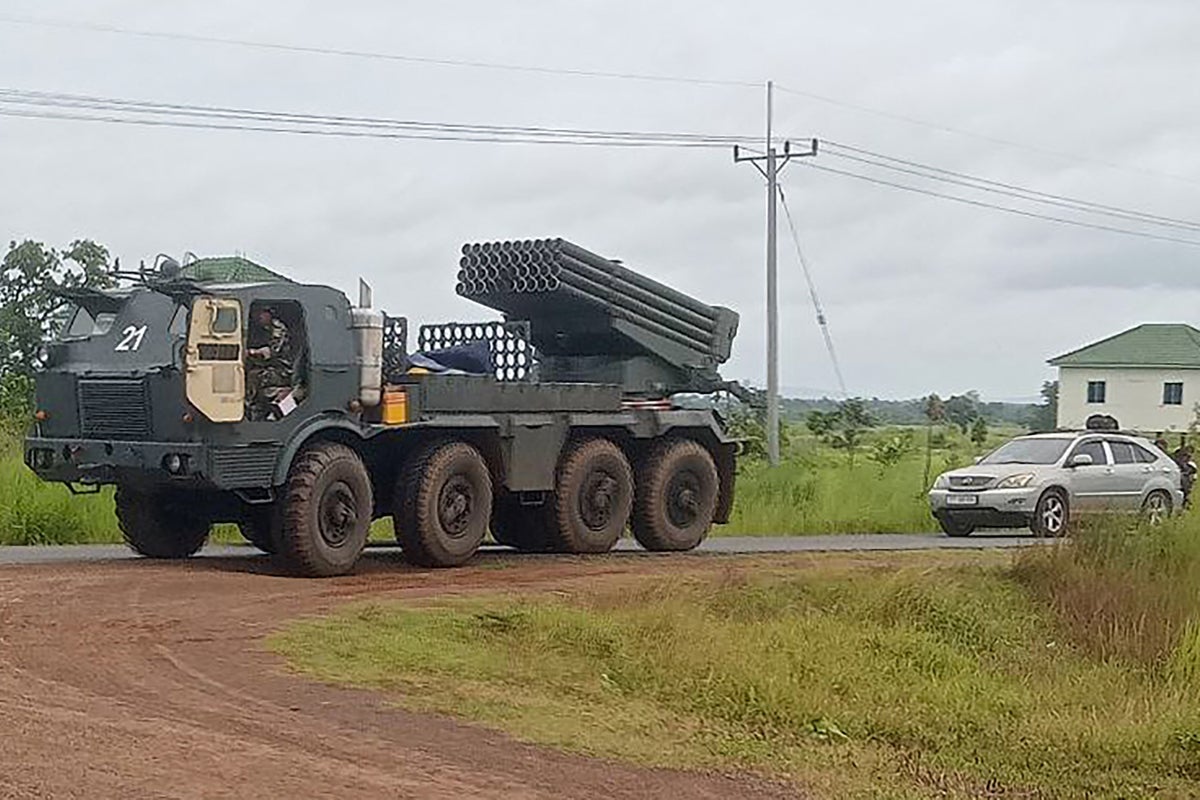Thai and Cambodian troops exchanged fire across several disputed border zones on Thursday, killing at least one person, injuring three and prompting a sharp deterioration in diplomatic ties between the Southeast Asian neighbours.
The clashes began early Thursday morning near the ancient Prasat Ta Moan Thom temple, located along the border between Thailand’s Surin province and Cambodia’s Oddar Meanchey. Both sides accused each other of initiating the attack.
Further skirmishes were reported near the Prasat Ta Krabey site and along the border separating Cambodia’s Preah Vihear province and Thailand’s Ubon Ratchathani. A livestream from Thailand showed civilians fleeing explosions and seeking shelter in concrete bunkers as gunfire continued in the area.
Cambodian prime minister Hun Manet claimed Thailand had targeted Cambodian military positions at multiple places.
“Cambodia has always maintained a position of peaceful resolution of problems, but in this case, we have no choice but to respond with armed force against armed aggression,” Mr Hun said.
Tensions had been running high since a Cambodian soldier was killed during a brief exchange of gunfire in a disputed border area in late May. Matters escalated dramatically earlier this week after Thailand accused Cambodia of laying new landmines in disputed territory. The accusation came after a Thai soldier lost a limb in a landmine blast, the second in a week.
Bangkok then recalled its ambassador from Phnom Penh and announced the expulsion of Cambodia’s envoy late on Wednesday.
By Thursday morning, the conflict appeared to spiral out of control as the Thai military deployed air power. One of its six F-16 fighter jets stationed near the border launched an attack, destroying what Thai officials described as a Cambodian military target.
“We have used air power against military targets as planned,” Colonel Richa Suksuwanon, deputy spokesperson for the Thai army, said.
Cambodia’s defence ministry did not immediately comment on the reported airstrike. However, the government strongly denounced what it called “reckless and brutal military aggression” by Thailand, accusing the neighbour of violating its sovereignty and a prior agreement aimed at reducing tensions.
Phnom Penh also alleged that Thai fighter jets had dropped two bombs on a road inside Cambodian territory.
In the wake of the clashes, Thailand ordered the closure of all its border crossings with Cambodia as fears grew of a wider military escalation. The two countries share an 817km border, parts of which remain undemarcated. The region has long been a flashpoint for conflict and witnessed a deadly weeklong artillery exchange in 2011 that left over a dozen dead.
The Southeast Asian neighbours have contested sovereignty over various undemarcated places along their 817km land border for more than a century.
This is what you need to know about the latest conflict.
What is the latest conflict about?
The conflict erupted in May when the armed forces of Thailand and Cambodia briefly fired at each other in a relatively small “no man’s land” claimed as their own by both countries.
Both sides said they acted in self defence. One Cambodian soldier was killed.
Although Cambodia and Thailand said afterwards that they had agreed to de-escalate the situation, their officials continued to implement or threaten measures short of armed force at each other, keeping tensions high.
Thailand added restrictions at the border, limiting crossing times and barring Thai casino tourists and workers from crossing into Cambodia.
Cambodia banned Thai movies and TV shows, stopped the import of Thai fruits and vegetables and boycotted its neighbor’s international internet links and power supply.
How long have the two fought over land?
Border disputes have long caused periodic tensions between the two neighbours. Thailand and Cambodia share a land border of more than 800km.
The contesting claims have stemmed largely from a 1907 map drawn up by French colonial rulers that was used to separate Cambodia from Thailand.
Cambodia has been using the map as a reference to claim territory, while Thailand has argued the map is inaccurate.
In February, Cambodian troops and their family members entered the ancient Preah Vihear temple in one of the disputed areas and sang the Cambodian national anthem, leading to a brief argument with Thai troops.
In 1962, the International Court of Justice had awarded sovereignty over the area to Cambodia, making it a major irritant in bilateral relations.
Cambodia went back to the court in 2011, following several clashes between its army and Thai forces which had killed about 20 people and displaced thousands.
The court reaffirmed the ruling in 2013, a decision that rattled Thailand.
What happens next?
Similar to the Phear Vihear area, Cambodia is seeking a ruling again from the ICJ over several disputed areas. Thailand has said it doesn’t accept the jurisdiction of the ICJ and that any conflicting border claims between the two should be solved by the existing bilateral mechanism, including a joint committee established in 2000 as a technical means to discuss the survey and demarcation of the land border.
Cambodia nevertheless said it had submitted the case to the ICJ and insisted that it would no longer discuss these areas under the bilateral mechanism.
Tensions have soared as they engaged in a war of words likely intended to mollify nationalistic critics on both sides of the border.
Bickering neighbours
The ill feeling between the two neighbors is not just about overlapping border claims but also deep-seated cultural enmity going back to when they were large and competing empires centuries ago.
In more modern times, bad feelings have lingered as Cambodia’s development, hindered by French colonialism and, in the 1970s, the brutal rule of the communist Khmer Rouge, has fallen well behind Thailand.
Both have fought over claims on cultural products ranging from boxing, mask dancing, traditional clothing, and food.

